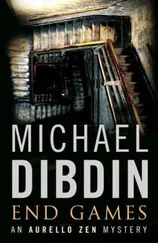Michael Dibdin - Cabal
Здесь есть возможность читать онлайн «Michael Dibdin - Cabal» весь текст электронной книги совершенно бесплатно (целиком полную версию без сокращений). В некоторых случаях можно слушать аудио, скачать через торрент в формате fb2 и присутствует краткое содержание. Жанр: Полицейский детектив, на английском языке. Описание произведения, (предисловие) а так же отзывы посетителей доступны на портале библиотеки ЛибКат.
- Название:Cabal
- Автор:
- Жанр:
- Год:неизвестен
- ISBN:нет данных
- Рейтинг книги:5 / 5. Голосов: 1
-
Избранное:Добавить в избранное
- Отзывы:
-
Ваша оценка:
- 100
- 1
- 2
- 3
- 4
- 5
Cabal: краткое содержание, описание и аннотация
Предлагаем к чтению аннотацию, описание, краткое содержание или предисловие (зависит от того, что написал сам автор книги «Cabal»). Если вы не нашли необходимую информацию о книге — напишите в комментариях, мы постараемся отыскать её.
Cabal — читать онлайн бесплатно полную книгу (весь текст) целиком
Ниже представлен текст книги, разбитый по страницам. Система сохранения места последней прочитанной страницы, позволяет с удобством читать онлайн бесплатно книгу «Cabal», без необходимости каждый раз заново искать на чём Вы остановились. Поставьте закладку, и сможете в любой момент перейти на страницу, на которой закончили чтение.
Интервал:
Закладка:
With extreme caution, he opened the door opposite. The elaborate plaster moulding, picture rail and ceiling rose revealed that this had been intended to serve as the dining room, but following his mother’s arrival Zen had commandeered it as his bedroom. As far as he was concerned, whatever it lacked in charm and intimacy was more than compensated for by its proximity to the front door. High on the list of problems caused by his mother’s presence in the house was the fact that every time she saw him putting on his coat Signora Zen wanted to know where he was going and when he’d be back, while on his return she expected a detailed account of where he’d been and what he’d been doing. Exactly as though he were still ten years old, in short. It was, Zen had concluded, the only way in which mothers could relate to their sons, and therefore not something for which they were to be blamed, still less which there was any point in trying to change. Nevertheless, it got on his nerves, particularly since his relationship with Tania Biacis had begun to make ever greater demands on his time.
Zen had been separated from his wife Luisella for ever a decade, but in the eyes of the Church and Zen’s mother they were still married. In his previous affair, with an American expatriate, Zen had used this as a way of maintaining his distance. Ellen had ultimately returned to New York, disappointed by Zen’s unwillingness to commit himself to her more fully. Now the tables had been turned with a vengeance. Zen would have been more than happy to present Tania to his mother as his fidanzata, that usefully vague category somewhere between steady girlfriend and future wife. It was she who had refused, with a light laugh which, had he been less in love, might have seemed almost insulting.
‘I’m sorry, Aurelio, but after eight years of Signora Bevilacqua I can’t face having to deal with another mamma just yet.’
So it was back to the lies and deceptions which had characterized his affair with Ellen. If he felt less guilty about them, it was not only because his feelings for Tania had a self-justifying intensity, but because his mother was no longer the pathetic figure she had been at that time. The change dated from the previous year, when the Zens’ apartment had been broken into by Vasco Spadola, an ex-mobster bent on revenge. Signora Zen had been forced to go and stay with Gilberto and Rosella Nieddu, where she had proved to be such a hit with the Nieddu children that she now spent two afternoons a week looking after them.
The effect of this surrogate auntyhood — greatly appreciated by the Nieddus, whose relatives were all in their native Sardinia — had been to transform Signora Zen from a semi-comatose recluse, parasitic on the imported soap operas doled out by Channel 5, into a sprightly, inquisitive old person with opinions and interests, still sharply critical of the city in which she lived like a foreigner, but also aware of its attractions and possibilities. Zen had had mixed feelings about this at first, since it meant revising a number of his own attitudes and habits, but he soon came to appreciate the fact that Signora Zen was out of the house more. It was easier in every sense to sneak off and spend time with Tania when he knew that his mother was happily occupied elsewhere.
He still needed to keep his stories straight, though, and in the present case that meant not being seen at home. He had been away from both home and work for the past two days, but as far as his mother was concerned his absence was not caused by illness but by an urgent mission to Florence. Alarmed by the effects of Moscati’s call to the house, Zen had phoned her that morning from Tania’s bed and repeated the story, so it would be difficult for him to explain his abrupt return just a few hours later. Hence the extreme caution with which he closed himself into his bedroom and walked across to the chest of drawers, making sure to avoid the creaky floorboard near the foot of the bed.
He eased the middle drawer open as gingerly as though it were filled with unstable high explosive, although at first sight it seemed to contain nothing but socks and underwear. Zen moved a pile of vests at the back of the drawer and pulled out a small scarlet plastic bag marked Profumeria Nardi. He opened the mouth of the bag and peered at the tangled plastic twine inside, the end melted to a blob by the flame of his lighter. The remaining portion would still be there, tied to the foot of the railing on the upper gallery of the dome of St Peter’s. It too would have a terminal blob of transparent plastic, slightly darkened by the flame.
He stuffed the bag into his coat pocket and went over to the wardrobe in the corner. Pulling up a rickety wooden chair which stood near the wash-basin in the corner, Zen lifted down the small leather suitcase on top of the wardrobe. He snapped the catches quietly and opened the lid. The suitcase was almost full with packets, boxes and papers. Zen removed a small flat wooden box, which must have been upside down, for the hinged lid opened and the contents clattered all over the floor.
His mother either didn’t hear the noise or must have assumed that it came from outside, for she didn’t stop talking. Zen knelt down and collected the tools and instruments. One had rolled right under the bed, and when Zen crawled in there to retrieve it he caught sight of some writing on the wooden bedstead. With an effort, he could just make out the irregular lettering: Zen, Anzolo Zuane, 28 March 1947. The inscription blurred and he felt a terrible panic grip him. Seizing the metal instrument he had come in search of, he thrust himself out from under the dream-soaked structure of the bed, back into the light and the air of the room. The name written on the bedstead was his father’s — Angelo Giovanni in Italian — but the writing was his own, and by 1947 the man named must have been long dead in some frozen swamp or Soviet prison camp. Only his son had continued to insist, secretly, magically, on his father’s continuing presence in the house.
He stood up and dusted himself down, then tiptoed over to the door leading to the hallway. Pressing against the door to prevent the catch snapping against the edge of the mortise, he gripped the handle and turned. He put his ear to the crack and listened. To his dismay, the aural radar on which he depended had gone dead. The only sound was the continual murmur of traffic in the street outside. With a glance at his watch, he opened the door quickly. The hinges shrieked.
‘Is that you?’ called his mother.
‘Eh?’ shouted Maria Grazia from the bedroom.
‘Was that you?’
There was a pause as the housekeeper interrupted her work and appeared in the doorway of the living room.
‘What, signora?’
‘Was that you?’
‘Was what me?’
‘That noise.’
‘What noise?’
‘It sounded like… like the front door opening.’
His mother sounded anxious. Homes never feel the same after they’ve been violated by a break-in. Maria Grazia’s bulky form suddenly appeared in outline on the glass-panelled door to the living room. Zen stepped back hastily.
‘It’s shut,’ the housekeeper reported, having presumably taken a look down the hall.
‘Go and check!’ Zen’s mother insisted.
Zen tried to close the door, but it was too late.
‘Mother of God!’ cried Maria Grazia as she caught sight of him.
‘What is it?’ Signora Zen called from the living room. ‘What’s happened?’
‘I’m not here!’ Zen whispered urgently to the housekeeper.
Maria Grazia put her hand on her abundant bosom and mimed relief.
‘It’s all right, signora,’ she yelled. ‘I just banged my elbow.’
She opened the front door and made energetic shooing gestures to Zen, who left his hiding place and slipped out on to the landing and down the stairs to freedom with a smile of gratitude.
Читать дальшеИнтервал:
Закладка:
Похожие книги на «Cabal»
Представляем Вашему вниманию похожие книги на «Cabal» списком для выбора. Мы отобрали схожую по названию и смыслу литературу в надежде предоставить читателям больше вариантов отыскать новые, интересные, ещё непрочитанные произведения.
Обсуждение, отзывы о книге «Cabal» и просто собственные мнения читателей. Оставьте ваши комментарии, напишите, что Вы думаете о произведении, его смысле или главных героях. Укажите что конкретно понравилось, а что нет, и почему Вы так считаете.












